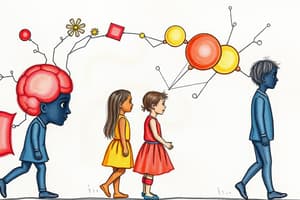Podcast
Questions and Answers
Which stage of Erikson's psychosocial development involves the conflict of intimacy versus isolation?
Which stage of Erikson's psychosocial development involves the conflict of intimacy versus isolation?
- Middle Adulthood (correct)
- Adolescence
- Old Age
- Early Childhood
In social psychology, which phenomenon describes poor decision-making outcomes resulting from group conformity?
In social psychology, which phenomenon describes poor decision-making outcomes resulting from group conformity?
- Social loafing
- Groupthink (correct)
- Deindividuation
- Cognitive dissonance
What role does Vygotsky emphasize in cognitive development?
What role does Vygotsky emphasize in cognitive development?
- Individual maturation without external influence
- Social interaction and cultural context (correct)
- Stage-based cognitive milestones
- Innate intelligence and genetic factors
What characterizes the sensorimotor stage of Piaget's cognitive development theory?
What characterizes the sensorimotor stage of Piaget's cognitive development theory?
Which type of research method involves studying the same individuals over a period of time?
Which type of research method involves studying the same individuals over a period of time?
During which stage of development do humans typically focus on identity formation and peer relationships?
During which stage of development do humans typically focus on identity formation and peer relationships?
What concept in social psychology explains the improvement of performance on tasks when in the presence of others?
What concept in social psychology explains the improvement of performance on tasks when in the presence of others?
Which term refers to the adjustment of an individual's behavior to align with group norms?
Which term refers to the adjustment of an individual's behavior to align with group norms?
Flashcards are hidden until you start studying
Study Notes
Introduction to Psychology
Developmental Psychology
- Definition: Study of how and why human beings change over the course of their life.
- Key Concepts:
- Stages of Development:
- Infancy (0-2 years): Attachment, sensory and motor skills.
- Childhood (2-12 years): Language development, social skills, and cognitive growth.
- Adolescence (12-18 years): Identity formation, peer relationships, and independence.
- Adulthood (18+ years): Intimacy, life satisfaction, and career development.
- Theories:
- Piaget's Cognitive Development Theory: Stages of cognitive development (sensorimotor, preoperational, concrete operational, formal operational).
- Erikson's Psychosocial Development: Eight stages of psychosocial development, each with a conflict that must be resolved.
- Vygotsky's Sociocultural Theory: Importance of social interaction and cultural context in cognitive development.
- Stages of Development:
- Research Methods:
- Longitudinal studies: Same individuals studied over time.
- Cross-sectional studies: Different individuals at various ages studied simultaneously.
Social Psychology
- Definition: Study of how individuals think, feel, and behave in social contexts.
- Key Concepts:
- Social Influence: How individuals are affected by the presence and actions of others.
- Conformity: Adjusting behavior to fit group norms.
- Obedience: Following direct commands, often from authority figures.
- Attitudes: Evaluations of people, objects, and ideas; can influence behavior.
- Formation: Influenced by experiences, socialization, and media.
- Change: Can occur through persuasive communication or cognitive dissonance.
- Group Dynamics: How group membership influences behavior and decision-making.
- Groupthink: Poor decision-making outcomes due to conformity within a group.
- Social facilitation: Enhanced performance on tasks in the presence of others.
- Social Influence: How individuals are affected by the presence and actions of others.
- Research Methods:
- Experiments: Controlled studies to test hypotheses about social behavior.
- Surveys: Questionnaires that gather data on attitudes and beliefs.
- Observational studies: Watching and recording behavior in natural settings.
Developmental Psychology
- Focuses on the changes in humans throughout their lifespan.
- Stages of Development:
- Infancy (0-2 years): Key developments in attachment, and sensory and motor skills.
- Childhood (2-12 years): Major milestones in language acquisition, social ability, and cognitive advancement.
- Adolescence (12-18 years): Critical phase for identity formation, peer relationships, and fostering independence.
- Adulthood (18+ years): Emphasis on intimacy, career progression, and overall life satisfaction.
- Theories:
- Piaget's Cognitive Development Theory: Describes four stages of cognitive development, emphasizing how thinking evolves.
- Erikson's Psychosocial Development: Outlines eight stages where individuals face psychosocial conflicts that shape personality.
- Vygotsky's Sociocultural Theory: Highlights the role of social interactions and cultural influences on cognitive development.
- Research Methods:
- Longitudinal Studies: Track the same subjects over time to observe changes.
- Cross-Sectional Studies: Compare different age groups at a single point in time to assess variations across development stages.
Social Psychology
- Examines individual behavior in social contexts and the influences of social factors.
- Key Concepts:
- Social Influence: Refers to how people's thoughts, feelings, and behaviors are shaped by others.
- Conformity: Involves adjustments in behavior to align with group norms, often to gain acceptance.
- Obedience: Compliance with direct orders from authority figures, showcasing power dynamics.
- Attitudes: Comprised of evaluations that affect actions toward people, objects, and ideas; shaped by experiences and socialization.
- Formation: Influenced by personal experiences, societal norms, and media portrayal.
- Change: Can result from persuasive communication techniques or experiences of cognitive dissonance, where contradictory beliefs create discomfort.
- Group Dynamics: Investigates how group membership impacts individual behavior and decision-making processes.
- Groupthink: Occurs when conformity leads to poor decisions in a cohesive group.
- Social Facilitation: Occurs when the presence of others enhances an individual’s performance on tasks.
- Research Methods:
- Experiments: Controlled environments to test hypotheses regarding social interactions.
- Surveys: Gather data on individuals' attitudes and beliefs through structured questionnaires.
- Observational Studies: Involve recording and analyzing behaviors in natural settings without interference.
Studying That Suits You
Use AI to generate personalized quizzes and flashcards to suit your learning preferences.




